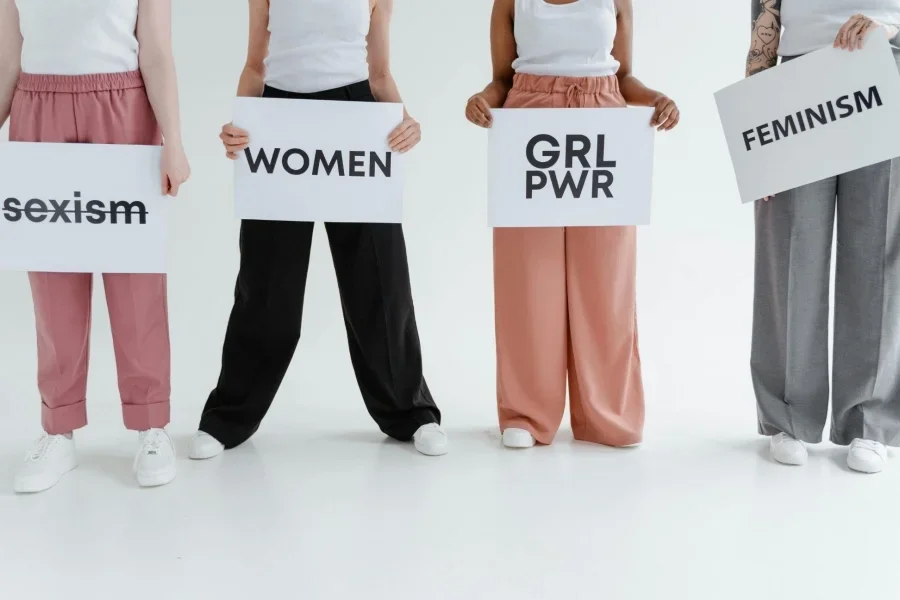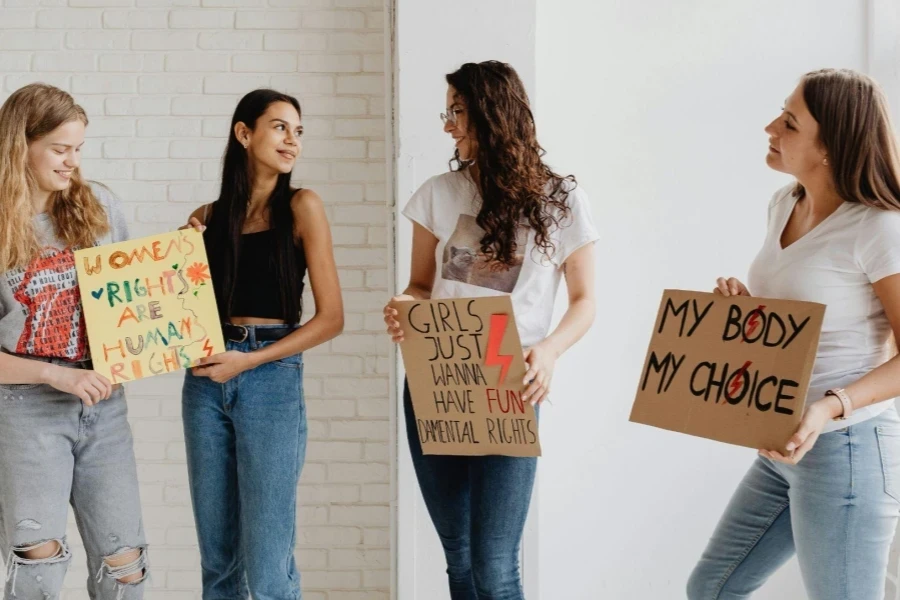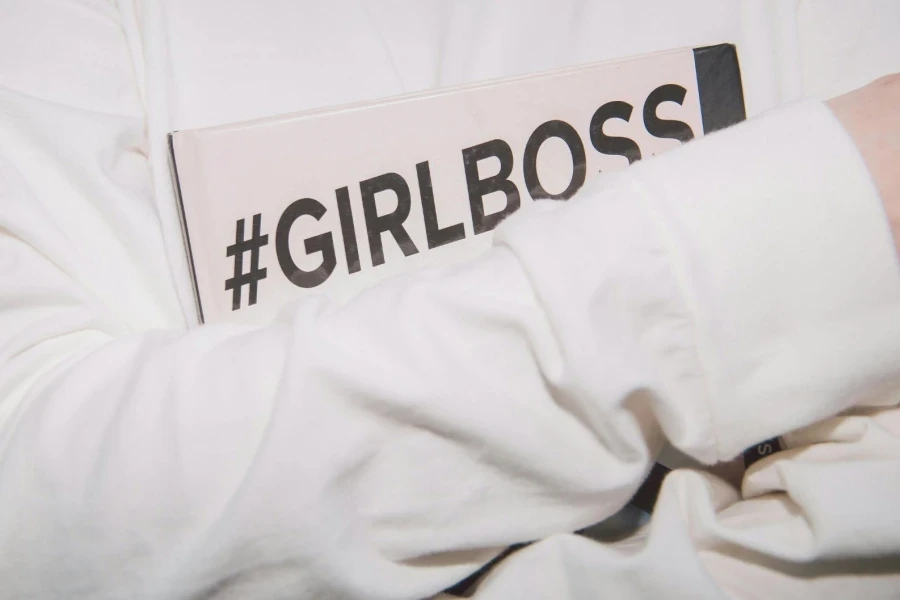It starts with a neon-green eyeshadow palette. Then comes the TikTok audio: a distorted clip of Charli XCX snarling “I’m your angel, I’m your devil” as a 22-year-old in Seoul films herself scribbling “4B” on her bedroom mirror in lipstick. By the time the video hits 1 million likes, it’s spawned 40,000 reaction videos—girls in Mexico City burning love letters, students in Lagos staging “No Weddings, Just Wifi” flash mobs, and a Montana teen live-streaming her “soft girl” ritual of embroidering “I Hate Capitalism” onto pastel pink tote bags. Welcome to fifth-wave feminism, where hyper-femininity collides with systemic annihilation—and Gen Z isn’t asking for a seat at the table. They’re building a new one from the ashes of bridal magazines and Botox ads.
Table of Contents
The Aesthetics of Nuclear Fury
4B: The Korean Spark That Lit a Global Inferno
Brands: Dancing on the Glass Cliff
The Coming Storm

The Aesthetics of Nuclear Fury
If fourth-wave feminism lived on Twitter threads, the fifth wave thrives in deliberate contradictions. Take Charli XCX’s 2024 Brat tour—a spectacle of saccharine chaos where fans arrived wearing tulle skirts splattered with fake blood, dancing to lyrics like “I’ll ruin your party if you make me cry.” The merch table sold $85 “Corporate Hostage” necklaces (chokers with broken keychains) and “Burn the Timeline” planners with pages pre-scribbled with “My value ≠ productivity.” This isn’t rebellion as a phase; it’s a calculated rejection of what sociologist Luiza Jarovsky calls “the oppression of either/or femininity.” Gen Z refuses to choose between Barbie and Oppenheimer. They’ll be both, complete with radioactive pink fallout.
The numbers confirm the cultural fission. Spotify’s 2023 Year in Music report revealed a 189% surge in playlists titled “Sad Girl Autumn” and “Rage Ballet.” Meanwhile, Depop’s top-selling aesthetic tags shifted from “#Cottagecore” to “#CrisisCore”—think Victorian nightgowns accessorized with gas masks. Even the film industry felt the tremor: Greta Gerwig’s Barbie grossed $1.4 billion globally not because it was aspirational, but because its dreamhouse dystopia mirrored Gen Z’s reality. As 19-year-old film critic Marisol Velez tweeted, “Ken’s existential crisis hit harder than my therapy bills.”

4B: The Korean Spark That Lit a Global Inferno
To understand the fifth wave’s velocity, look to Seoul—where the 4B movement transformed quiet resistance into a geopolitical shockwave. It began in 2019 with author Cho Nam-joo’s novel Kim Jiyoung, Born 1982, a visceral account of South Korea’s gendered violence. By 2023, over 65,000 women had sworn off dating, marriage, childbirth, and heterosexual sex (the “4Bs”). But this isn’t passive withdrawal—it’s active sabotage. Members use apps like Ghost GPS to fake locations when harassed for dates, while underground networks trade tips on sterilisation clinics and solo housing loans. The impact? South Korea’s birth rate plummeted to 0.72 children per woman in 2023, the lowest globally.

The movement’s global mutation is where it gets radical. In São Paulo, artist Anita Prado’s 4B Manifesto mural—depicting women chainsawing wedding cakes—went viral before being defaced with “Return to Kitchen” graffiti. The backlash fueled solidarity: 50,000+ selfies flooded #AbolishTheAltar, including a photo of Tunisian students projecting the mural onto ancient Roman ruins. Even religion isn’t immune. When the Vatican condemned 4B as “a crime against natural law,” Gen Z nuns fired back with TikTok skits satirising celibacy double standards—one featuring a habit-clad sister deadpanning, “Sorry, Father, I only answer to God… and my stock portfolio.”
Brands: Dancing on the Glass Cliff
Consumer culture is scrambling to adapt—with disastrous and dazzling results. Glossier’s 2024 Rage Blush campaign nailed the zeitgeist. The $32 crimson blush compact, marketed with ads showing women ugly-crying at board meetings while applying makeup, sold out in 14 hours. Its tagline (“Feel Everything, Apologize for Nothing”) became a protest chant at women’s rights marches. Contrast this with Victoria’s Secret’s robotic 2023 Femme Future reboot. Their AI-designed “feminist lingerie” backfired when activists exposed that the algorithm was trained on male CEO feedback. The cringe climax? A $168 “Empowerment Bralette” that literally left indentations spelling “Girl Boss” on skin.

Yet some brands are bridging the virtual/physical divide. Take Betty, the friendship app where Gen Z women orchestrate “Third Space” revolutions. Its Friend Divorce feature—allowing users to ceremonially “break up” with toxic pals via virtual confetti explosions—drew 4 million downloads in 2023. Offline, London’s women-only Siren Coffee chain offers soundproof “Scream Booths” where patrons vent rage via karaoke (think Miley Cyrus’ “Flowers” on loop). Founder Esraa Ali explains: “We’re not anti-men. We’re anti-‘having to perform sanity’ 24/7.”
The Coming Storm
The fifth wave’s critics call it fragmented—too individualistic, too TikTok-ified. They miss the point. When 24-year-old Zara Ahmed stormed the 2024 Met Gala with “We Want Board Seats, Not Hashtags” painted on her gown, she wasn’t just protesting fashion’s performative allyship. She embodied a generation done begging for crumbs. As reproductive rights crumble and climate disasters accelerate, Gen Z women aren’t hedging bets. They’re building parallel universes—one glitter-bombed, men-free, unapologetically femme reality at a time.
The question isn’t whether brands will adapt. It’s whether they’ll survive the creative destruction. As the graffiti in Seoul’s 4B headquarters warns: “We’re not your target market. We’re your jury.”





